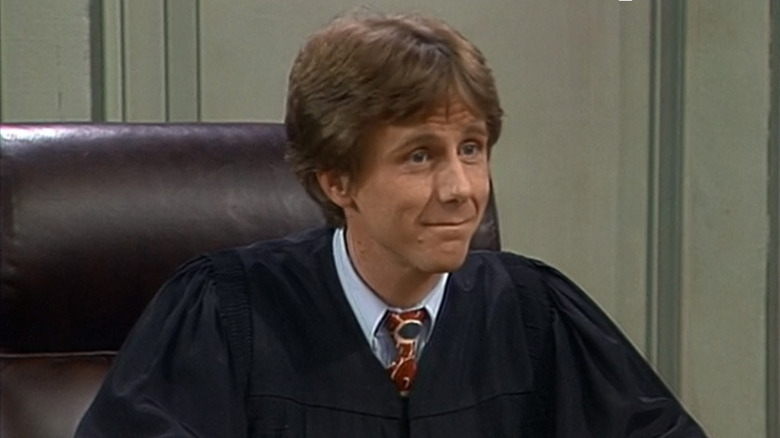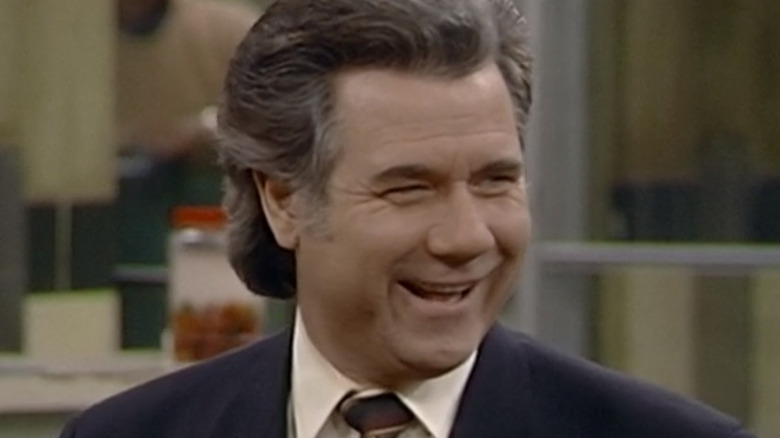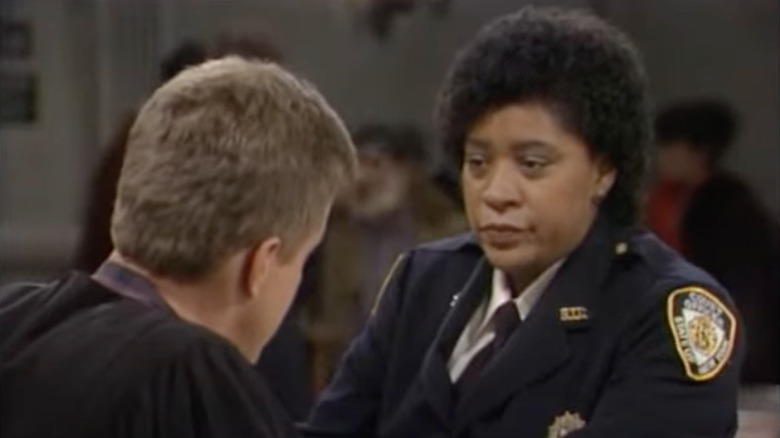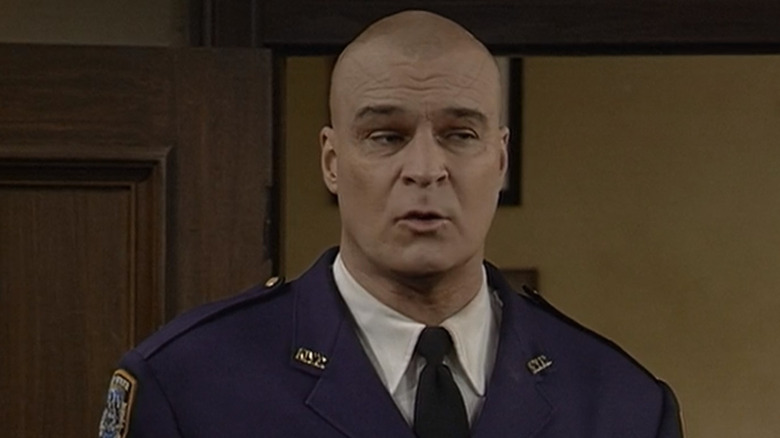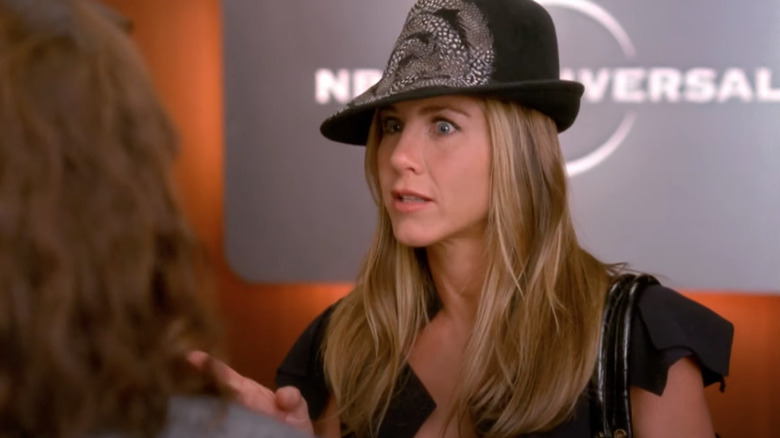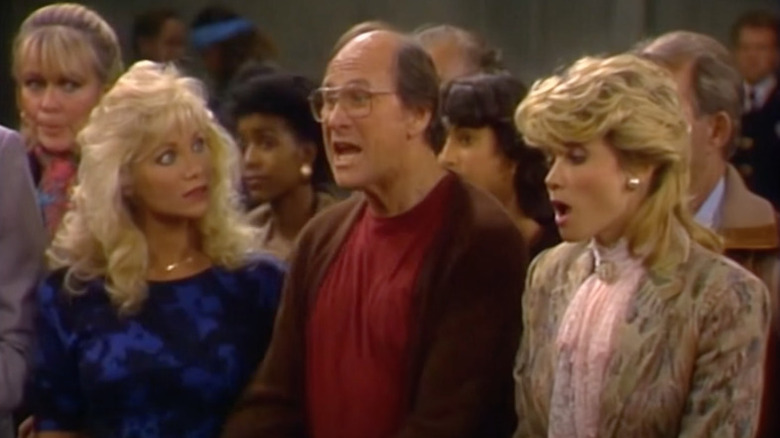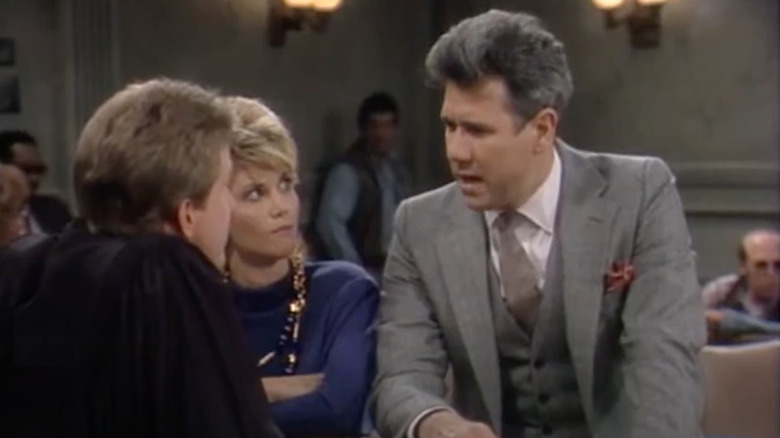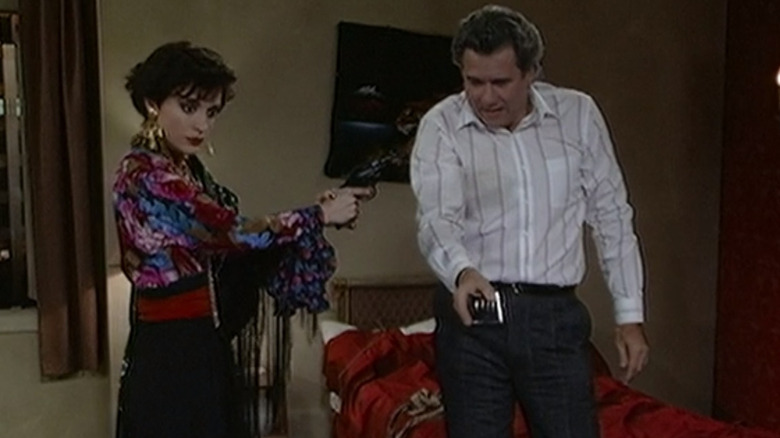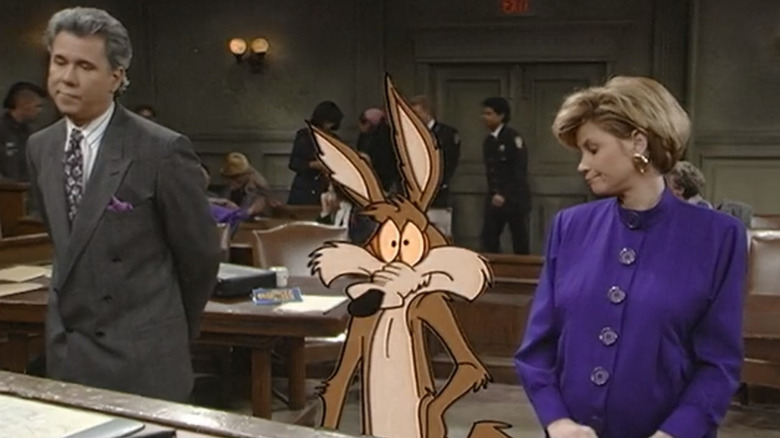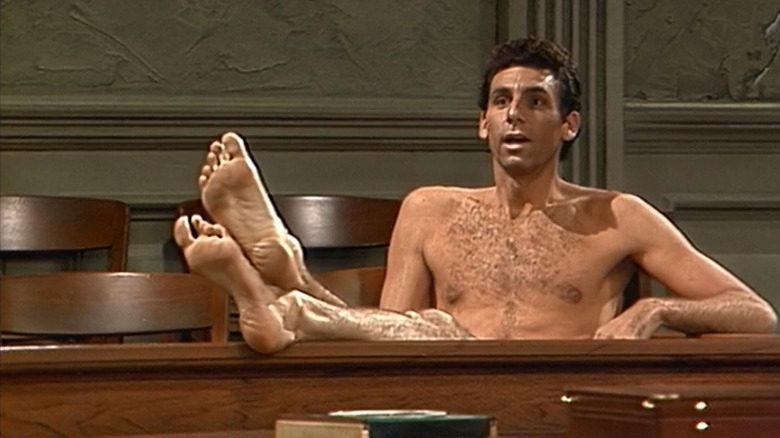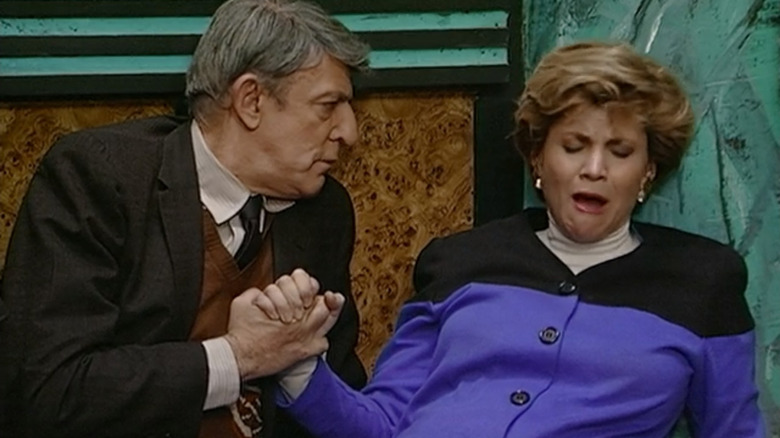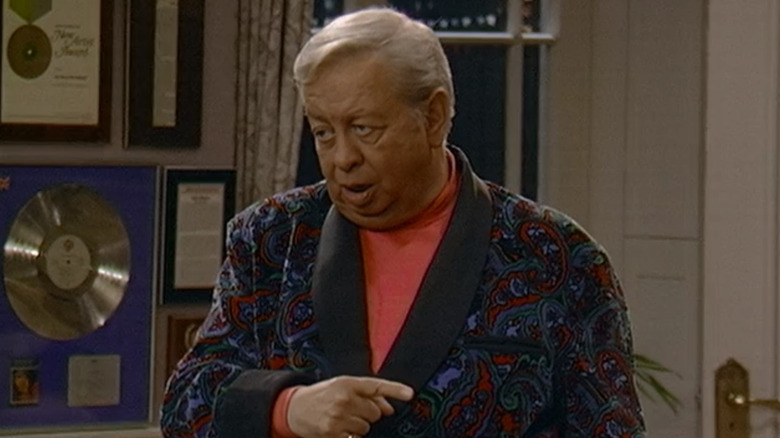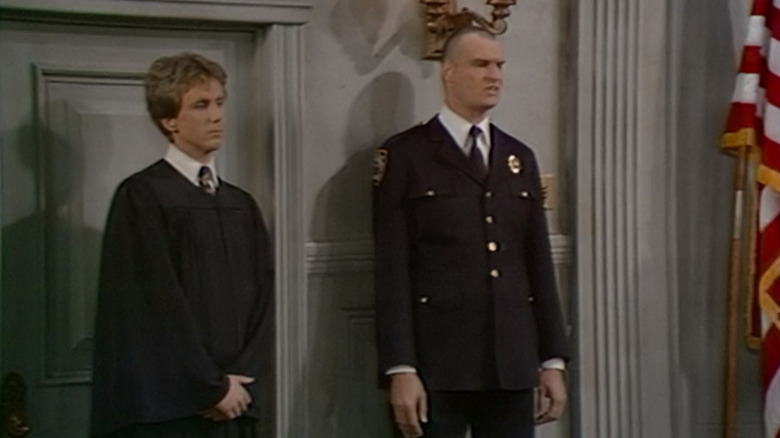Things You Only Notice In 1984's Night Court After Watching It More Than Once
Before beloved NBC sitcoms such as "Brooklyn Nine-Nine," "Friends," and "Seinfeld," the network gave birth to the zany legal comedy, "Night Court." First airing in 1984, the show follows a downtown municipal night court that presides over petty crimes, with its key cast comprised of irreverent judges, prosecutors, and bailiffs. Starting its life as the midseason replacement to follow "Cheers," "Night Court" held enough popularity to run for nine seasons until its end in 1992. In 2023, the series was revived, exploring stories of an entirely new "Night Court" generation while still bringing back some familiar faces.
Even though the original "Night Court" has been off the air for over 30 years, the show is still a favorite among viewers. Characters such as Christine (Markie Post), Dan (John Larroquette), and Roz (Marsha Warfield) provided plenty of entertainment and strong storylines across the show's run — but even among the core cast, there are many small details that fans might have missed the first time around. From final ending woes to unexpected guest appearances, here's what to look out for when you next watch "Night Court."
There was no final ending
Though "Night Court" had been with fans for the best part of 8 years, its sudden ending has still left viewers confused to this day. Even though the show was pulling in positive reviews after 8 solid seasons, its ninth outing left a lot to be desired. Before "Night Court" became the success story that we recognize, NBC had decided the show was going to air for exactly 8 seasons — prompting its creative team to painstakingly craft stories that ended with satisfaction in the finale. When the surprise ninth season was announced, making the new installment was a last-minute scramble.
As a result of the unexpected news, "Night Court" never really got a bonafide finale. Roz doesn't really have anything change in her story, Lisette (Joleen Lutz) hardly appears in the final two-parter, and Dan's sudden change of heart toward Christine feels disingenuous. Speaking to LA Times in 1992, executive producer Stu Kreisman said "when we found out we were going to go for another year, we were screwed creatively, and it took us the first two or three episodes of this year to undo all the stuff we set up last year." Larroquette later added to this in another LA Times piece, stating: "Warner was trying to sell it elsewhere. So they didn't want a definitive ending."
The bailiff curse was lifted by the third person
As "Night Court" started to pick up some steam, a subconscious trend was noticed by eagle-eyed viewers. Referred to as the "bailiff curse," the term summarizes the veteran actresses who died while playing the show's infamous female bailiff. The curse can be pinpointed to two people — Selma Diamond and Florance Halop. Both were around the same age, suffered from a similar form of lung cancer, and passed away during the show's production while playing the same role. This led people to believe that the role might be cursed when producers tried to cast the part for a third time.
Diamond played bailiff Selma Hacker throughout the first two seasons of "Night Court," while Halop then portrayed Florence Kleiner for a further 22 episodes. The curse was finally broken by Warfield, who joined the show as the younger yet no-nonsense bailiff, Roz, in 1986. Staying until the program's final episode in 1992, Roz was supposedly only meant to be a one-shot character – perhaps due to the then-known bailiff curse. Roz quickly became a fan favorite, toeing the balance between being unfriendly and inwardly shy.
There's a reason for Richard Moll's bald head
Richard Moll's portrayal of "Night Court" bailiff, Aristotle Nostradamus "Bull" Shannon, was quick to become a show highlight — so much so that some viewers have already stated that the NBC reboot of the show won't work without him. Dim-witted with a heart of gold, Bull is a character who can often be seen before he is heard with Moll's 6'8 height regularly towering over his fellow cast members. Before he was cast on the show in 1983, Moll had been working on the sci-fi film, "Metalstorm: The Destruction of Jared-Syn." While the name might not trip off of the tongue, it meant that Moll already had a bald head after filming.
Though Bull was never originally intended to be bald, show creator Reinhold Weege liked his look so much that he was convinced to keep it. Speaking to People magazine in 2003, Moll stated just how keen he was to preserve his appearance for the role. "When I went in they said, 'Oh, that's great. We love the look. Will you shave your head for the role? I said, 'Are you kidding? I'll shave my legs for this role.' " Though his character might have had a tough physical look, Moll's performance made sure that Bull's softer side continued to shine through.
30 Rock helped to offer answers the original series didn't
Though many viewers would rather not relive its disappointing ending, the original run of "Night Court" abruptly ended after a two-part finale in its ninth season. Before the reboot was announced, plenty of narrative storylines were left unexplained — yet another sitcom might have offered up some answers later down the line. 16 years after "Night Court" was canceled, fellow NBC comedy series, "30 Rock," explored its lack of closure in the Season 3 episode, "The One With the Cast of Night Court." Key members of the cast including Harry Anderson and Markie Post make important cameos, with Christine and Judge Stone ending up getting married.
While some stars including Larroquette did not make an appearance, the ones who did return received a mixed response. Neither TV critics nor sitcom fans found the crossover overly funny, citing the plot to have no redeeming features for the "Night Court" additions. The episode also features a guest appearance from Jennifer Aniston, playing Claire Harper, a woman noticeably obsessed with Jack Donaghy. Fans of the original series might have got some form of closure through the fake ending, even though "30 Rock" arguably shone the cameo limelight on Aniston.
Sex workers and pimps were named after real people
Given the premise of "Night Court," it's no surprise that viewers were introduced to plenty of colorful characters along the way. Across its eight-year run, court scenes featured the likes of sex workers and pimps who were integral to storylines over single episodes and entire seasons. However, it was only in the later Season 1 DVD commentary that creator Reinhold Weege revealed that he had thoughtfully named each and every cameo. According to his voiceover, the large majority of these side characters were named after real people he had met.
In Weege's mind, it was a way of "saying hello" to friends and acquaintances that he held dear to his heart. His love of shouting out those he knew was also mentioned in his obituary (via Los Angeles Times), passing in 2012 from natural causes at the age of 62. Weege had previously worked on Barney Miller in the 1970s and 1980s before his time on "Night Court," alongside spending time developing the acclaimed army doctor comedy series, "M*A*S*H."
Dan Fielding started out as conservative
Eagle-eyed viewers of "Night Court" might notice that Dan Fielding's personality looked a little different in earlier seasons than it did by the show's final outing. Referred to as a sex-obsessed and narcissistic prosecutor, Dan is best known for his witty yet somewhat cruel remarks to his fellow colleagues. When the comedy series first graced TV screens, the character appears to be somewhat more conservative, yet it's never explained why this changes over time. It was possibly a decision made because of the creative decision for the show to remain apolitical, instead of keeping silly and fun entertainment at its fore.
Speaking to the AV Club, Larroquette stated: "If you look at the early episodes, my character was this sort of tight-lipped, vested, pipe-smoking, conservative fellow, and of course I was putting garden hoses down my pants by the end of the series. I think what happens on a television series like that is that the creator of the show gets used to the characters and the actors playing them. They learn to write toward their strengths, which a good writer does. And Reinhold [Weege] saw that I was this maverick, crazy — that sounds self-inflating, but I have a rather acerbic sense of humor. Reinhold starting writing toward that and creating the character that everybody knows."
One episode features a Texas Chainsaw Massacre easter egg
From "Child's Play" to the A24 breakout horror flick, "Pearl," there have been plenty of references to the 1974 classic "The Texas Chainsaw Massacre" in subsequent film and TV releases. The original outing of "Night Court" is no exception, with Dan coming across the movie in the Season 6 episode, "Educating Rhoda." While stuck in a motel room with a woman who's taking an unhealthy interest in him, Dan flips over to "The Texas Chainsaw Massacre" on the room's TV in order to distract her. Though he claims to have already seen it, there's a real-life connection to the film that some viewers may have missed.
Before his long-running tenure on "Night Court," Larroquette was perhaps best known as the narrator in the OG "The Texas Chainsaw Massacre" itself. In January 2023, Larroquette confirmed the rumor that he was paid marijuana to take on the role as a favor to the film's director, Tobe Hooper. In an interview with Parade, Larroquette said: "[Hooper] gave me some marijuana or a matchbox or whatever you called it in those days. I walked out of the [recording] studio and patted him on the back side and said, "Good luck to you!"
Night Court crossed over with Looney Tunes
By Season 7 of "Night Court," viewers had probably figured out that the show wasn't afraid of making off-the-wall episodes. One cameo that stands out from the rest is seen in the episode, "Still Another Day in the Life," which features the famed "Looney Tunes" duo, Wile E. Coyote and Road Runner. In this court scene, Judge Stone (Harry Anderson) condemns the coyote for harassing Road Runner, stating that if he was hungry, he should go to a restaurant instead. Given that the pair's cartoons continue to air to this day, it doesn't seem as though Wile E. Coyote took his time in court too seriously.
Behind the scenes, the storyline was a nod to the powerhouse production studio, Warner Bros. At the time, the company was responsible for both "Night Court" and "Looney Tunes," even if bringing the two together didn't initially seem like a natural fit. In the lead-up to the "Night Court" reboot, some Reddit users have also cited the scene while speculating where the show's storylines might take us next.
Michael Richards was naked in one scene
Viewers might know him best as Kramer from "Seinfeld," but Michael Richards made his appearance in the original "Night Court" a memorable one. At the midway point of the show's second season, the episode, "Take My Wife, Please," briefly features Richards as Eugene Sleighbough, who believes that he is invisible. Though the episode mainly focuses on Mac (Charles Robinson) marrying a woman he met in Vietnam, Eugene's storyline mostly takes place in court after being caught stealing while believing he couldn't be seen. Just before the closing credits, Richards walks into court completely naked, claiming his clothes were affecting his ability to be invisible.
Though his contribution to "Seinfeld" five years later arguably helped turn the show into one of the funniest sitcoms in TV history, Richards' stint in "Night Court" got exactly the laughs that it wanted. Some viewers still remember his scenes clearly years later, praising both the quality of the script and Richards' comedic performance. The original "Night Court" was a key player in scouting out fresh faces that later went on to become TV stars — such as James Cromwell and Fran Drescher – with Richards' fleeting naked appearance possibly the most memorable of the bunch.
Christine's pregnancy was inspired by real life
Much of the seventh season of "Night Court" is dedicated to exploring Chirstine's unexpected pregnancy. To explain her bump, Christine ends up marrying Detective Tony Giuiliano (Ray Abruzzo) before going into labor at the season's halfway point. She gives birth while trapped in an elevator with Harry's father, Buddy (John Astin), leaving viewers on a happy cliffhanger before the two-part premiere for Season 8. Though the storyline isn't the best for Christine's marriage to Tony — which ends only a few episodes into Season 8 — it is especially convenient for the actress behind Christine, Markie Post.
Instead of trying to find a way to cover it, Christine's journey arc in Season 7 was built specifically around Post's pregnancy in real life. Her daughter, Daisy, was born a few months after Season 7 wrapped in 1990, after finding out she was pregnant shortly after filming began. The actress, who sadly passed away after a battle with cancer in 2021 aged 70, welcomed two daughters with husband and fellow actor and writer, Michael A. Ross.
Repeat Mel Tormé cameos came from the script
While "Night Court" gave birth to future comedy stars such as Michael Richards and Fran Drescher, it also gave a platform to respected artists in different films. Some viewers might notice that famed musician Mel Tormé made frequent guest appearances throughout the show's run, racking up a total of eight credits between 1984 and 1992. Known for songs including "That's All" and "Comin' Home Baby," it's revealed early on in the comedy series that Harry Stone is one of Tormé's biggest admirers. After his friends and family told him that the show had mentioned this, Tormé was so honored that he agreed to be on the show.
From his first appearance, Stone's love of Tormé turned into such a running joke that he appeared in "Night Court" a further seven times. What made the script even more uncanny was the fact that Harry Anderson was equally a huge fan of the jazz singer. With a new legacy born after his appearances, it's often said that Tormé gained popularity amongst a younger crowd thanks to his time on the program.
Politics never featured in the storylines
Unlike most modern-day sitcoms or '80s rivals such as "The Golden Girls" and "Different Strokes," "Night Court" never featured any kind of political commentary across all of its 193 episodes. Given that the show so heavily focuses on the inner workings of the law, it's not too far-fetched to assume that the court and politics could be intertwined. However, the show's apolitical stance was actually intentional. "Night Court" never actually approaches a serious topic, instead choosing to focus on making people laugh than offering a social comment.
According to Weege's Los Angeles Times obituary, it was something he addressed during a 1998 interview with Times: "The show may not be in any way intellectual and we don't make any pretense of dealing with issues that are impossible to address or solve in the sitcom format ... But if you just want to forget it all for a minute and laugh at pies in the face and pants around the ankles, that's what we do very well." Executive producer Stu Kreisman later agreed, telling Los Angeles Times in 1992, "We were so politically incorrect we would have had a cigarette sponsor if we came back next year."
